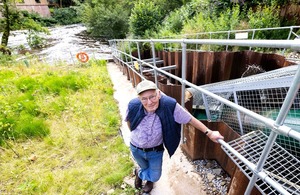Communities at the heart of new fund to boost local growth and energy security
£10 million fund to open in early Autumn and help deliver government’s ambitions to restore optimism and pride in local communities.

- New £10 million funding pot to empower local people to develop energy projects to benefit their local areas
- projects will generate clean energy, such as rural heat networks or rooftop solar, while kick-starting private investment to scale up projects
- fund will support local jobs and growth, build stronger communities, and enable places to directly benefit from clean, affordable, locally sourced energy
Rural and local communities across England will be supported in setting up local energy projects that will provide local jobs and deliver energy security, thanks to a new £10 million government fund.
Both urban and rural communities will have the chance to win a portion of a new £10 million Community Energy Fund - new government grant funding to help communities develop local renewable energy projects. The Community Energy Fund will open to applications in the early Autumn.
This funding will help to kickstart projects including small-scale wind farms and rooftop solar partnerships, as well as battery storage, rural heat networks, electric vehicle charging points, and fuel poverty alleviation schemes - all proposed, designed and owned by local people.
Minister for Nuclear and Networks Andrew Bowie said:
Local communities are at the heart of our plans to boost our energy security and grow the economy. The Community Energy Fund for England will empower communities to do just that.
With it, they’ll be able to drive forward innovative energy projects that will have a lasting positive impact, bringing costs down, building stronger communities, and securing clean energy for generations to come.
Importantly, these energy projects could expand beyond local areas by attracting further investment from the private sector, in turn inspiring other communities to power their area with energy from England.
Whether in a remote village or city neighbourhood, the projects will deliver families and business with affordable, secure and clean home-grown energy, while helping homes to manage their own energy consumption to bring down costs and reduce fuel poverty.
Promoting local growth, surplus money generated from the schemes can go directly back to the community through funding local projects such as community gardens and youth employment groups.
The fund will act as a catalyst for attracting private investment to scale up projects further down the line, supporting high-quality jobs and growth in the area.
In turn, this will help deliver on the government’s ambitions to restore optimism and pride in local communities as we build a better future across the country.
Today’s new Community Energy Fund follows the success of the former Rural Community Energy Fund (RCEF), expanding the remit to include renewable energy investment for both rural and urban areas.
As with the Rural Community Energy Fund, the new fund will be delivered through Local Net Zero Hubs, which support local authorities to develop net zero projects and attract commercial investment.
The Community Energy Fund will fund projects like Congleton Hydro, which received £73,511 funding from the Rural Community Energy Fund.
Thanks to government funding, the Congleton Hydro project is producing affordable, clean and secure electricity from a local weir – enough to power the equivalent of 60 homes. The project is not only reducing emissions in the area, but its success has also led to the creation of an annual £5,000 fund for local community projects. This has so far funded a re-wilding programme to protect nature in the local area and an educational programme on helping young people to deliver local sustainability.
Bob Owen, Chartered Engineer at Congleton Hydro, said:
The Rural Communities Energy Fund (RCEF) has been a real enabler for Dane Vally Community Energy’s Congleton Hydro, helping us to refine the system design and commission additional environmental studies required by the local planning authority.
The support received from RCEF is just not monetary, their facilitation of advice and assistance from a great range of contacts has been invaluable. The RCEF support also provided us with the opportunity to develop an education activity that focusses on the sustainability of the environment and a re-wilding programme—giving nature a helping hand.
Further funds from RCEF have enabled us to successfully specify and design the next Hydro Scheme based on another historic Weir in Congleton park and fund the research and the realisation of a Community Solar Scheme—the Community Share Prospectus. Without this incubator funding from RCEF, it is most unlikely that either scheme would have seen the light of day.